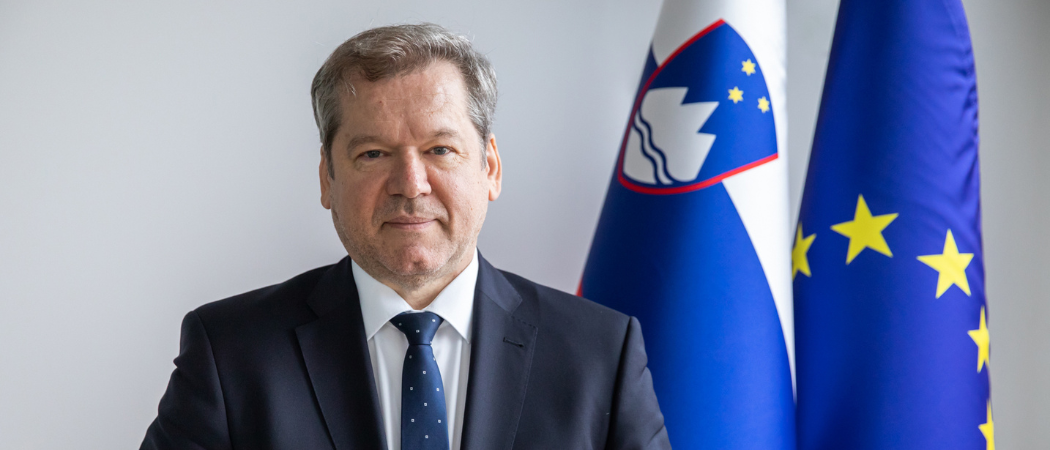As Slovenia advances plans for a new research and innovation agency, science minister Igor Papič decries the amount of EU R&D money paid to consultants for advice on filling in complex grant application forms

Igor Papič, Slovenia's Minister of Higher Education, Science and Innovation. Photo: Government of Slovenia.
Slovenian researchers are winning more Horizon Europe grants than in in the past thanks to additional support services organised by universities and research institutes, but science minister Igor Papič says the application process for EU grants could be simplified further.
“It’s practically impossible to make a successful [Horizon Europe] application without external support agencies,” Papič told Science|Business.
Before becoming a politician, Papič was the rector of the University of Ljubljana and was actively involved in EU research policy debates. Back in 2019, he entered a public spat with Wolfgang Burtscher, a former deputy director general for research and innovation at European Commission, over the complex application process in Horizon Europe.
Papič thought it unreasonable that applying for research funding was so convoluted researchers needed the help of consultants to write a proposal. Burtscher fired back saying it’s not the fault of the Commission that applicants “are not able to put their ideas in writing”.
Fast forward a few years: Burtscher has moved to the Commission’s agriculture directorate and Papič has entered politics with an ambition to change how his country funds basic and applied research, and to connect science to the needs of the private sector.
But the complexity of writing a Horizon application has not been reduced by much. In fact, according to submissions to the Commission’s most recent survey on research and innovation, the application process is still long, burdensome and costly. Researchers need to submit, along with proof that their idea is worth funding, a flurry of other documentation on gender equality, data management, open science principles and ensuring that their project does not harm the environment.
Papič believes this state of affairs is a great opportunity for consultancies in Brussels and across the EU, as consulting costs, which may go over 10%, can be sunk into the overall budget of research projects. “They are never working on research ideas, they are just trying to make these applications more attractive or closer to the Brussels way of thinking,” Papič said.
According to Papič, it’s very difficult to evaluate how much money research organisations are paying for consulting services, but in many cases, consultants become part of consortia and can get 10 to 15% of the budget for management services. “It's only management and, of course, adaptation of applications to the language of the Commission,” he added.
Two stage application
The Commission could solve this by implementing a two-stage application process, similar to the one used at the European Research Council (ERC). ERC applicants first submit 10 or 15 pages with their research idea. If the idea is deemed worthy of the next stage, the applicant is required to write down the management details of the project in a longer format. Although two-stage applications are already being used in some parts of Horizon beyond ERC, Papič said they should be used more widely throughout the programme. Adopting this approach would encourage more research teams and consortia to apply for Horizon grants, as it would greatly reduce the cost of entry in the first stage of the competition and increase the success rate in the second stage.
However, apart from ERC and a few other schemes that focus on individual researchers, Horizon Europe is funding collaborative projects with many partners from multiple countries and research institutions, which for many implies some kind of professional management is necessary. But said Papič, “The ERC is the most prestigious programme we have in Europe and if it's possible for ERC, why shouldn't we do that at the level of Horizon?”
Universities in Slovenia see a growing number of their researchers winning EU-funded projects, mainly thanks to improved support services. “I think we are one of the fastest improving countries in ERC competitions, but of course, we cannot be happy with this result,” said Papič.
The minister is also unhappy with the performance gap between richer and poorer EU member states and said the Commission should continue fine tuning its schemes dedicated to bridging that gap in the Widening programme. “I still don't believe that we are improving the situation,” he said.
For example, the Commission offers a “seal of excellence” for each project that passes Horizon thresholds for funding, but for which no money is available. Researchers are meant to use this certificate to get funding from national agencies, but Papič says the government does not have a big enough budget to cover the costs of the growing number of projects that are being sent back from Brussels.
In Ljubljana, Papič is working on launching a new agency called ARIS, that would bring research and innovation under the same roof, so the government can fund basic research and also prioritise public funding for technologies that are further along the development pathway. The government is aiming to fast-track the bill through parliament and have a first round of calls under the new agency by autumn.
Papič says he wants the Slovenian research and innovation system to be more competitive, but for that to happen, the country needs to create clearer funding mechanisms for funneling basic research into applied technologies.





 A unique international forum for public research organisations and companies to connect their external engagement with strategic interests around their R&D system.
A unique international forum for public research organisations and companies to connect their external engagement with strategic interests around their R&D system.